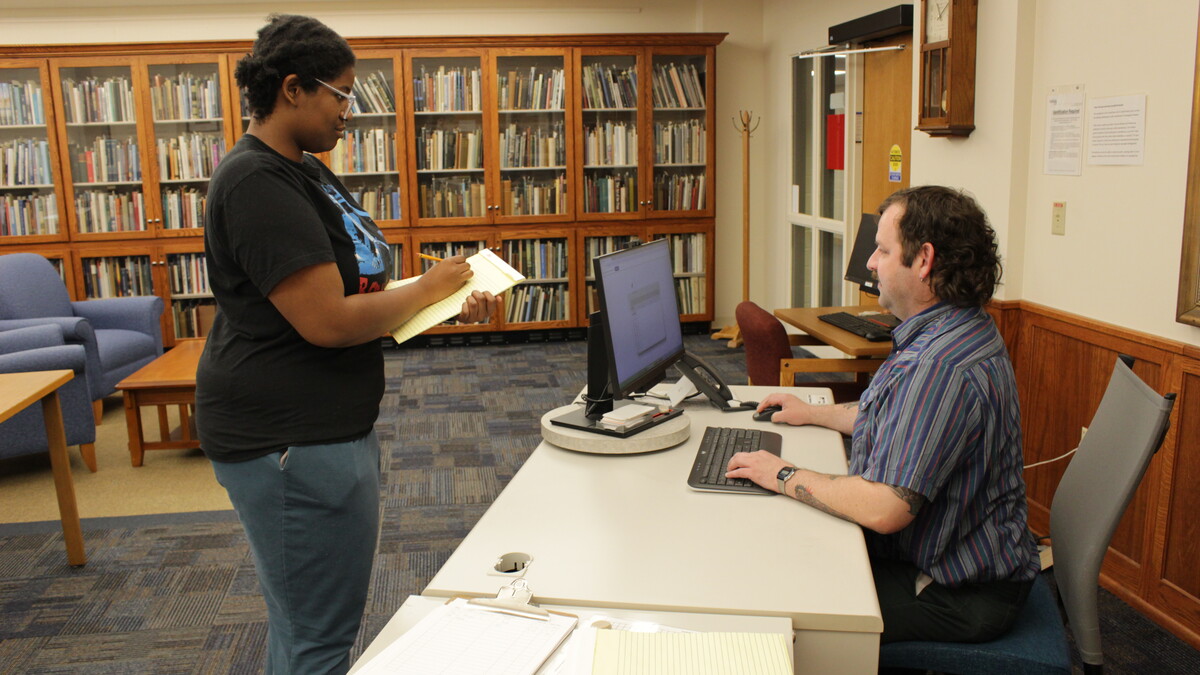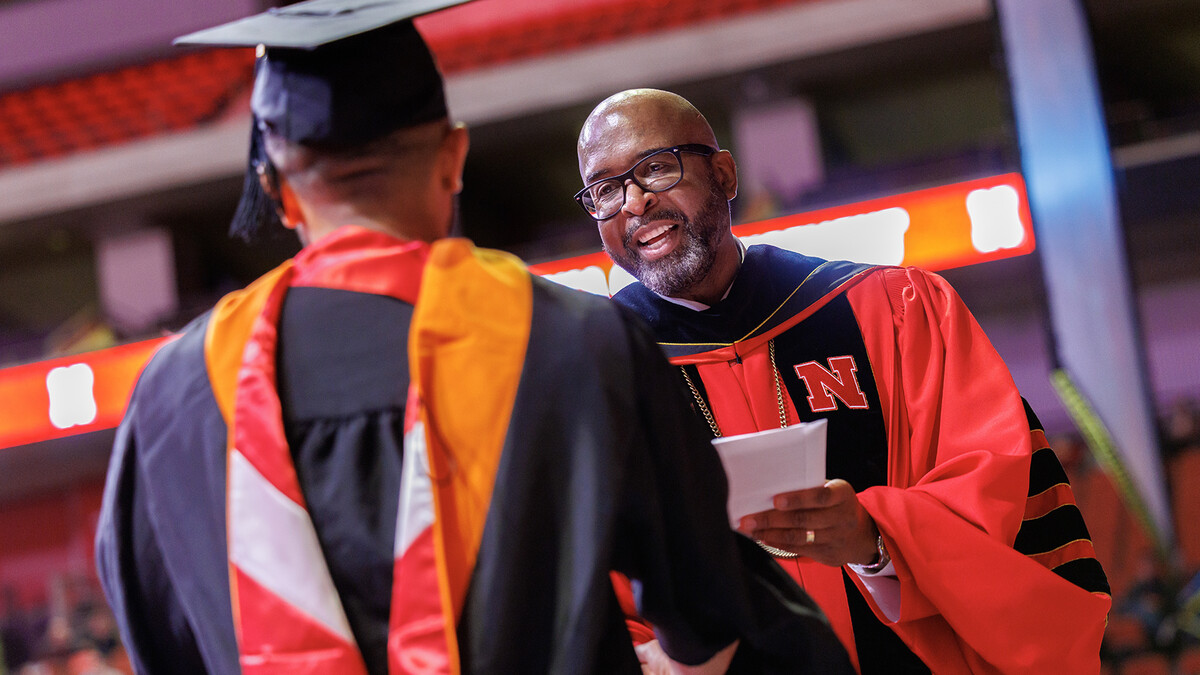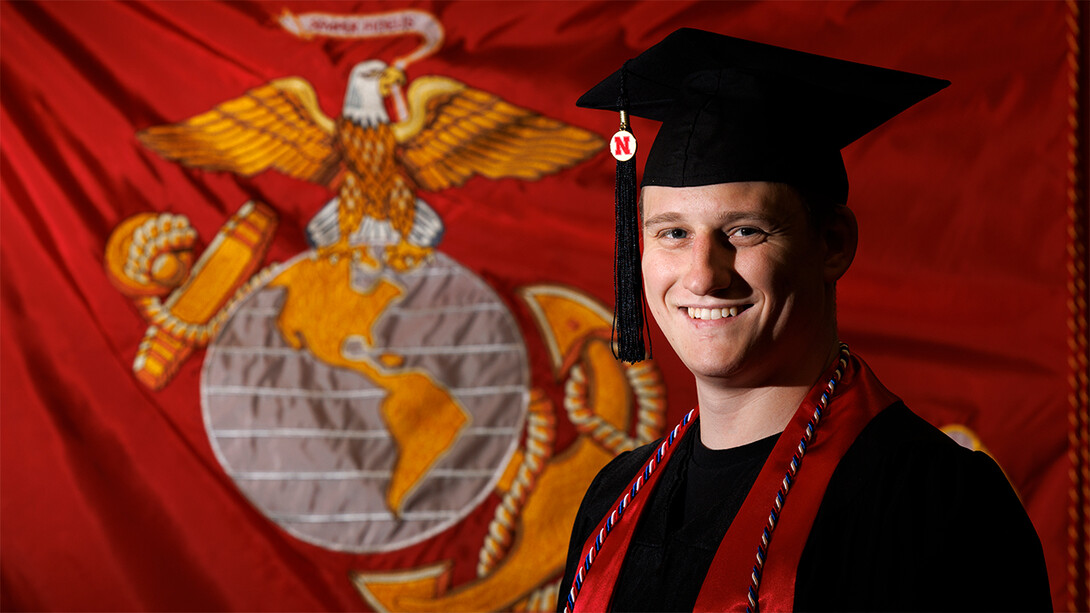
Even at 26, the Harley-riding Marine veteran can recall the only two non-A’s that befell him as a K-12 student: a B in eighth grade geometry, another in freshman algebra.
Years later, at Camp Pendleton, his backpack would overflow with 75-plus pounds of essential equipment. As a middle and high schooler, though, it was empty.
“I never brought a book home, never brought homework home. I always finished it before I even left class.”
And yet, somehow, here he was. Set on becoming the first from his family to graduate college, on taking the MCAT and entering medical school, L.J. Bird found himself failing multiple classes at the University of Nebraska–Lincoln.
But under the circumstances — trying, extenuating, extraordinary — the Husker sophomore was doing all he could. Because, for all the dense tomes that filled the biochemistry major’s backpack, Bird was shouldering much more.
The burden he bore would not break him, but it would steer him, temporarily, from Nebraska U — to the footsteps of a father, to a military legacy claimed, and, ultimately, to redemption in the form of a diploma.
*******“My family is very convoluted,” Bird said, and to hear him explain it — a father married four times, a mother three; a younger brother, an older half-brother and half-sister from his dad’s first marriage, former stepsiblings from subsequent marriages on both sides — is to get the full scope of his meaning.
Bird’s parents, who met in Lincoln and later settled in South Dakota, separated when L.J. was 3. He would move with his mother to a suburb of Austin, Texas, where she met and married her second husband.
“He had my brother and me brainwashed (into believing) that my dad was a terrible person,” Bird said. Within a few years, the sons would cease visiting their father, still up north. It was around the same time that his mother would lose her own dad, leaving L.J. bereft — emotionally, and of a worthy father figure.
“My grandpa was my idol growing up,” he said. “I loved him. He was my favorite person in the world — still is, to this day.”
In death, his grandfather would grant L.J. a gift: inspiration and aspiration that would stick. Even in grade school, the son of a nursing aide appreciated the fact that medicine had allowed his grandpa not just to endure, but live, through kidney failure and other health issues. Those extra years, the precocious Bird realized, were the reason he really knew his grandfather at all.
Medicine, the 10-year-old decided, is what I want to do. That foresight, along with witnessing and sometimes weathering the realities of paycheck-to-paycheck, would inform his approach to the classroom from that point on.
“I knew I needed to focus up and buckle down on school,” he said.
While the A’s piled up, Bird’s success in the classroom couldn’t shield him from the turmoil in his living room. His mother had divorced again. A new boyfriend, this one struggling with drug addiction, had entered the picture. By the time eighth grade rolled around, Bird was longing for some freedom and curious about the past. Halfway through the academic year, he talked his mom into letting him return to South Dakota and live, for the first time in roughly a decade, with his biological father.
He knew that, in running toward one parent, he was also running from the problems that were metastasizing with the other. Mostly, though, he was just heartened to learn that his father was not what he was made out to be.
“Dad was a very forgiving person, and very patient and understanding of the fact that he couldn’t control what my mom was telling us, or what our ex-stepdad was telling us,” Bird said.
Before long, he was getting a sense for how his father had spent the intervening years. L.J. was 15 or 16 when he first hopped on the back of his dad’s 2009 Harley-Davidson Ultra. He was terrified. He was thrilled. He was hooked. A few years later, he’d earn his motorcycle license, learning on an entry-level Harley that his father bought him.
“That has become one of the best things I can do if I’m ever stressed or need to just relax and forget everything,” he said. “That’s the only time that my brain actually shuts itself off, and I can just be present in the moment.
“Riding is a part of who I am.”
Bird was with his father for less than a year before his mother moved back to South Dakota, boyfriend in tow, eventually persuading L.J. to live with her for the second half of high school. During his junior year, they trekked down to Lincoln for a campus visit.
“I loved everything about being here, just thought it was beautiful,” said Bird, whose gleaming GPA would help earn him financial support via the Beadle Scholarship. “The people I had talked to, it just seemed like I was going to be successful here. And it was a stark contrast, because I had gone to visit a couple other schools, and I had felt kind of miserable on their campuses. So I felt very at home and knew this was going to be the right school for me.”
In August of 2015, the newly minted high school graduate would again head down to Nebraska U. His mother and her now-third husband would do the same. If it wasn’t what he would have chosen, well, he wasn’t going to say so.
“Growing up, I had a very unhealthy, co-dependent relationship with my mom,” Bird said. “I didn’t know how to tell her that I didn’t want her to follow me down for college.”
Immediately, the no-homework whiz kid was awash in it. Readings, assignments and concepts came faster than he had expected, setting a pace that dared him to keep up, forcing him to leave first gear for the first time he could remember. And as a first-generation student, one yet to declare a major, his opening semester sometimes left him unsure whom to consult, or where to go, or what to do.
If the first year was challenging, the second was disastrous. Like virtually all traditional first-year students, Bird had stayed in the dorms. Before his sophomore year, hoping to minimize his loans, L.J. agreed to move in with his mom, younger brother and newest stepfather, still in thrall to his addiction. It was spilling over to his mother by then, his worst habits becoming hers. And they were sapping the bank account: Funds intended to feed the family were now feeding his stepfather’s addiction, hurtling the household south of the poverty line.
A decision designed to save money was now costing L.J. in ways that went beyond the monetary. He had declared as a biochemistry major, which meant wading into biology courses and diving into organic chemistry — even as he took on a job in the vain hope of keeping his family afloat.
“I was financially responsible for taking care of my mom and my brother, and making sure we had a roof over our heads — as a first-generation college student, in a science major, with a pre-health designation,” he said. “As you can imagine, that did not work out very well.”
He was underwater now, the weight too much. By the end of his sophomore year, F’s were staring the ace student in the face, lengthening his odds of qualifying for med school. He fell out with his mom, returning to his dad’s place in South Dakota for the summer.
“I needed to get away from Lincoln and just get my head back on straight,” Bird said, “if I was going to come back and be successful at school.”
That was the plan: build up some funds by working for the county highway department that summer, then get back at it in the fall. He had maxed out on scholarship support — but he was loath to accrue any more debt, and his father was in no position to help.
As the semester approached, Bird found himself idling.
“I wasn’t really motivated to find anywhere to live,” he said. “I wasn’t motivated to enroll in classes. I just didn’t feel ready to come back. I knew I wanted to. I just knew I wasn’t ready to yet.”
His options felt limited. But his father had served in the Marine Corps. And if his old man had done it, L.J. figured he was among the few who could, too.
*******Ask Bird whether boot camp is as brutal as a civilian might suspect, and he responds with a question of his own: “Have you ever watched ‘Full Metal Jacket’?” The Marine Corps may not lay hands on recruits the way it used to, he says, but otherwise, “It’s really like that.
“Even when you use the bathroom, it’s on someone else’s watch. You have zero choices of your own that you get to make the entire time — well, unless you decide to quit.”
Bird would not quit. His family’s long history in the military — every male Bird from at least the past three generations had served, as had his beloved grandfather on his mom’s side — ensured that he had no illusions about the three months of hell that awaited him. No contact with family or friends, aside from sending letters whose replies would not arrive until boot camp was nearly done, anyway. Physical and psychological punishment, naturally, that ground eager recruits to gruel.
“My dad had been there, done that. So I knew full well what I was walking into,” Bird said. “That doesn’t mean I was fully prepared. There were times — and it’s gonna happen to everybody who goes to boot camp — there are times where you sit there, and you’re like, ‘Why did I do this to myself? Why am I here? What am I doing?’”
They save the worst for last: a 54-hour Marine-molding test known as The Crucible, during which recruits are deprived of sleep, provided just three “gross, disgusting” meals ready-to-eat, and put through navigation exercises, buddy drags and other rigors designed to simulate a combat operation. At any moment, a drill instructor might yell “Grenade!” before tossing a rock that recruits are trained to dive on, sacrificing themselves to save their fellow Marines. And near the end, a 9-mile hike while toting a pack that might weigh 60 to 100 pounds, culminating in a climb up an ultra-steep incline affectionately dubbed The Reaper.
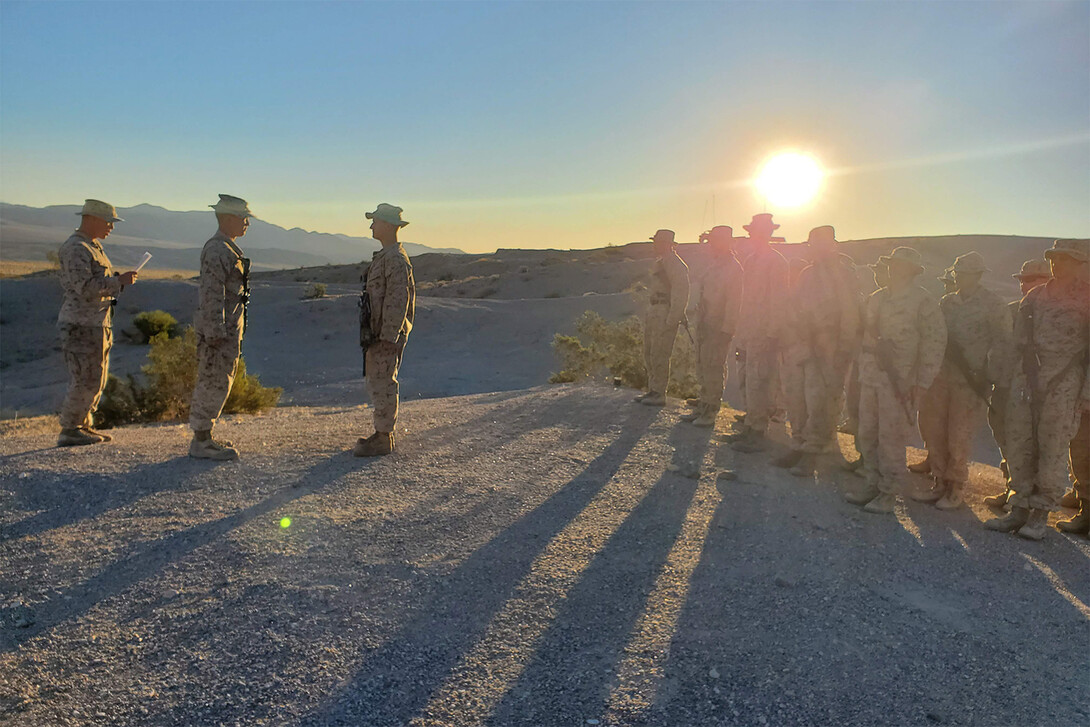
At the summit lies the reward: the Eagle, Globe and Anchor, the formal insignia of a full-fledged Marine.
“You still have restrictions,” Bird said. “But you’re almost a person again.”
Combat training would follow, then on to school for his occupational specialty as an artillery observer, like his father. By early 2020, Bird was qualified and authorized to manage rifles and other basic weaponry. And work and troubleshoot a radio. Which he could then use to call in a mortar strike, or a long-range artillery strike, or a naval gunfire strike, or request close air support, in the form of rotor-wing or fixed-wing aircraft, after having distinguished friendly forces from hostile and provided the precise coordinates of a target.
“So, one of the most stressful things I’ve ever done in my entire life,” he said, likening it to the multitrack bandwidth required of an air-traffic controller.
In the middle of it all, during rare downtime and a visit to Omaha, L.J. would meet his future wife. The two were engaged in October of 2019 and married two months later. Two months after that, just weeks prior to the outbreak of the COVID pandemic, L.J. was deployed to Okinawa, where he spent the next five months — brought home early by his father’s heart attack, which the elder Bird would survive.
Returning stateside gave L.J. the chance to finish what he’d started — not school, quite yet, but earning a place in the Leathernecks Nation Motorcycle Club, a nationwide crew of active-duty Marines and veterans who prefer two wheels to four. Bird had fond memories of the club from his teenage years in South Dakota, where his father established a chapter that L.J. has since joined.
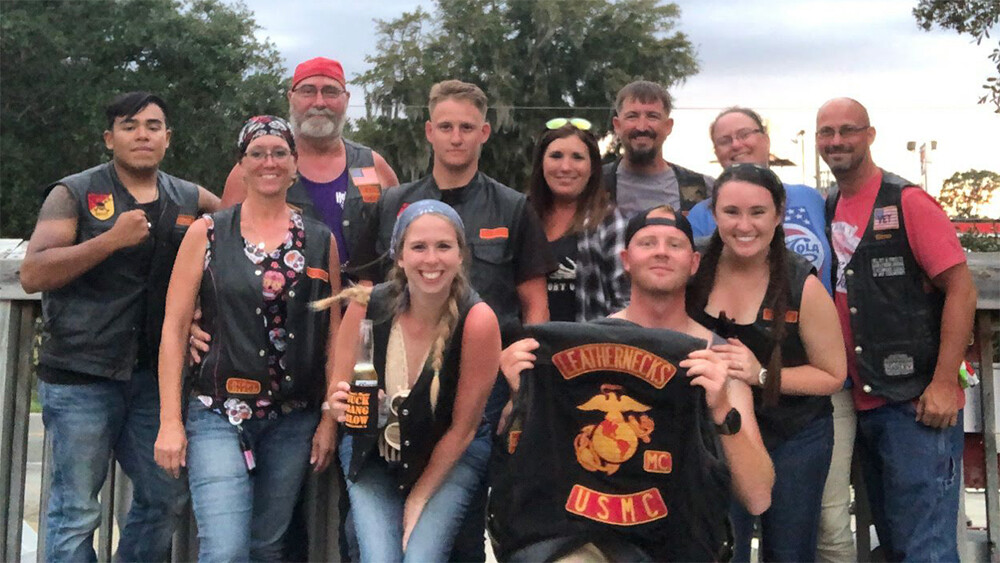
“A lot of the guys like to joke: There are only two things that Leathernecks like to do, and that’s drink beer and ride motorcycles,” he said. “But everyone who joins, they miss the Marine Corps in some way, or they need that camaraderie or that brotherhood in some way. That’s what we’re there for — to give each other someone to lean on. Obviously, veteran suicide is a huge issue. It’s one of the things that we really try to combat.
“Growing up around them, and seeing what they were giving back to the community — especially to the veteran communities that are sometimes forgotten about when they come back home — it just always gave me inspiration that I wanted to direct my life toward, that I found my happiness in.”
*******Bird could barely believe it. He hadn’t spoken with Erin Sayer, a professor of practice and adviser in the Department of Biochemistry, since mid-2017. And they had talked, what, a handful of times during his first go-round at Nebraska? So when Bird reached out about the possibility of re-enrolling, he figured he would need to jog her memory. He was wrong.
“She remembered who I was — not just recognized my name, but actually remembered meeting with me, some of the conversations that we had had,” he said. “Her passion and drive for helping her students succeed was, by far, the biggest factor (in coming back).
“I knew that she was going to help me be successful. If I was going to get to medical school, especially with some failures on my transcript, she was going to be the one who was going to help me figure out what I needed to do to get there.”
For starters? Jumping straight back into the deep end by retaking the courses he had failed and, hopefully, surfacing with a higher GPA. After years away, none of them spent thinking much about biochemistry, those courses hit like a splash of cold water.
“It was very intimidating, the first couple of weeks.”
The most daunting of all: Organic Chemistry II, an academic equivalent of The Crucible if ever there was one. When he scored a 60-something on the first exam, Bird didn’t hesitate in turning to the instructor for extra help.
“He had office hours every day after class. And I was in his office every day after class for the entire semester,” Bird said, laughing. “But it ended up working out in my favor, because I understood it way better than I did the first time I took it” — and wound up with an A. He would go on to make the dean’s list for the first time.
“I kind of fell into a rhythm,” he said, “and it started coming back to me.”
Still, there were limits, and now, a snag. Back in the spring of 2016, Bird had declared his major in the College of Arts and Sciences, which required multiple years of a foreign language. Bird had opted for French, taking several courses in it before he left. Much like the physical sciences, he had not spoken or read French since heading into the Marines. Unlike the science material, Bird couldn’t fathom picking the language back up again, no matter how much time and diligence he devoted to it. And, given his goals, he couldn’t afford a subpar grade.
Sayer, as usual, was there with a solution: switching to the biochemistry track in the College of Agricultural Sciences and Natural Resources, a move that exempted him from the language requirement.
“I text her probably at least once a week: ‘Uh, hey, this thing just happened. What do I do?’” Bird said with a grin. “I’ve probably annoyed her a little bit, I’m sure. But she had me so ahead of the curve that by the time med school applications opened, I submitted almost that first day.”
Before med school, though, he’ll walk the commencement stage on Dec. 16, making his family proud by making family history.
“It’s almost unreal,” he said, to know that he’ll soon be a first-generation graduate. “After I dropped out, and while I was in the Marine Corps, there were times when I doubted whether I would ever finish my degree.
“It’s been a lot of hard work, and it’s taken a lot of people behind me, too.”

Bird has yet to decide which branch of medicine he’ll pursue. Orthopedics, possibly, or maybe trauma surgery — specializations that would allow him to care for wounded veterans, those who have sacrificed their own health in exchange for the security of a country they value above their own well-being, those he rides with, those who would jump on the grenade.
Once again, Bird’s backpack is not empty, but full. He welcomes the weight.
“I think there’s no greater honor in our society,” he said, “than being a military veteran.
“So I will stop at nothing to make sure that I find a way to give back and help that community as much as I can.”

